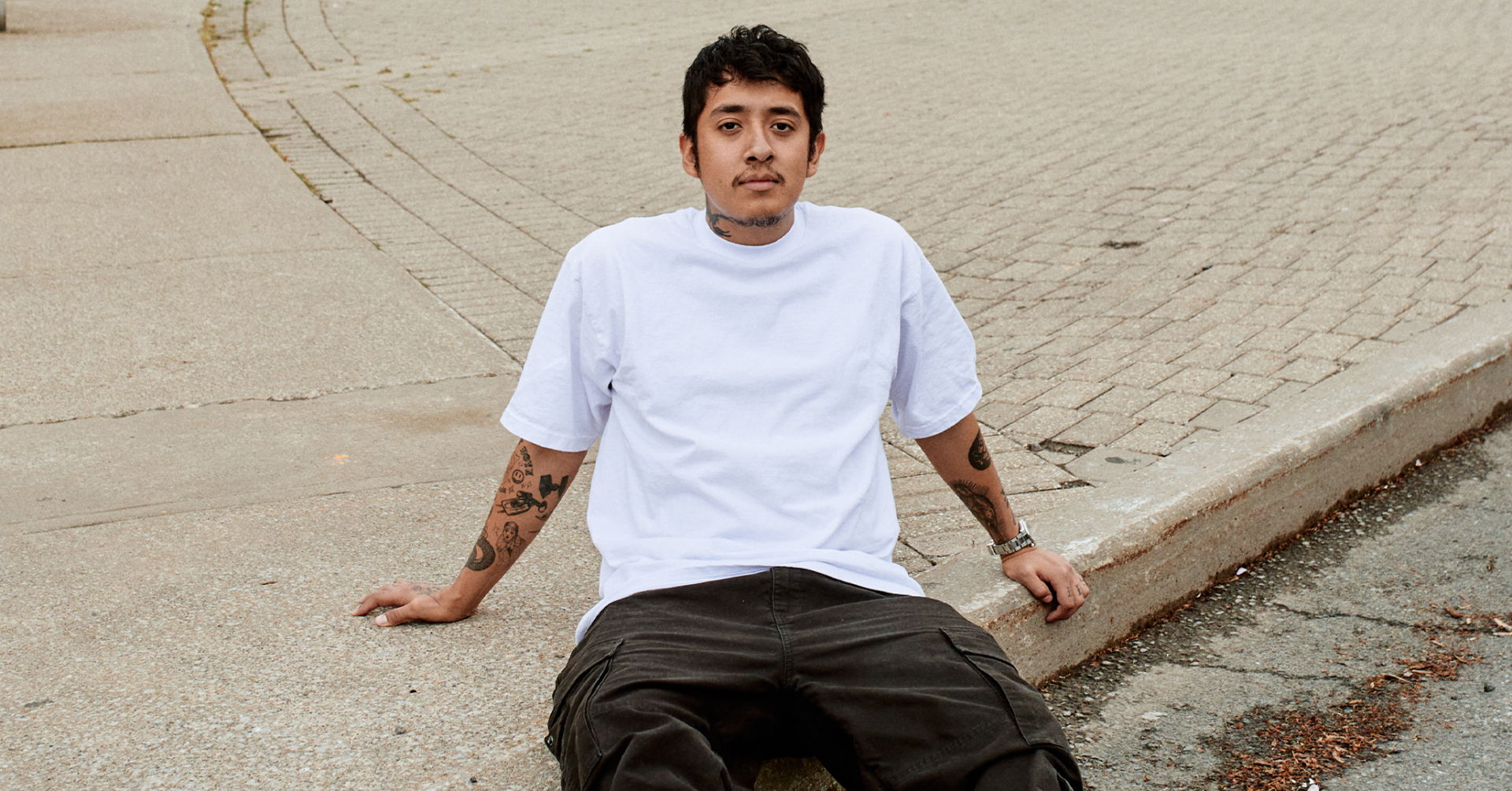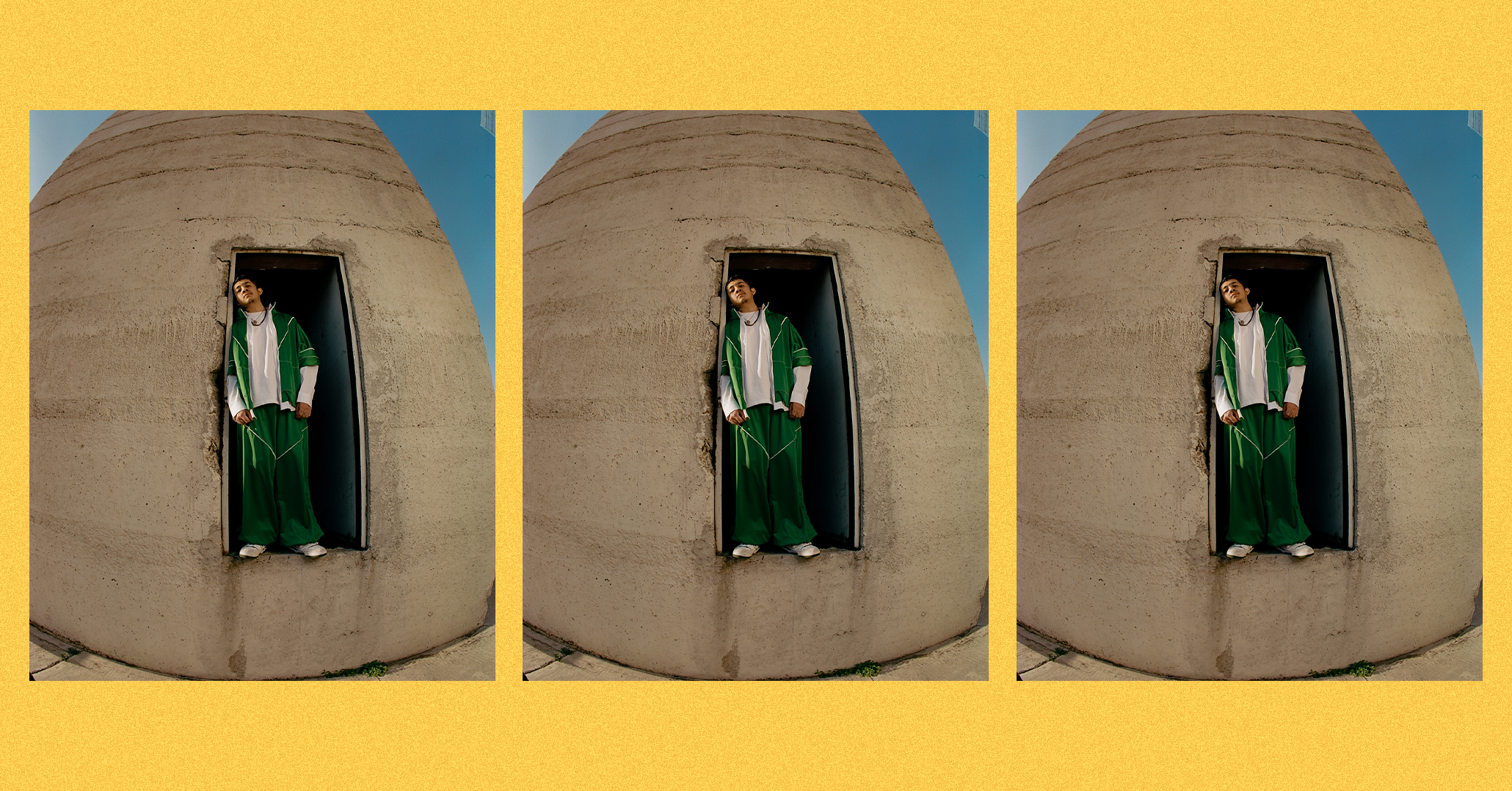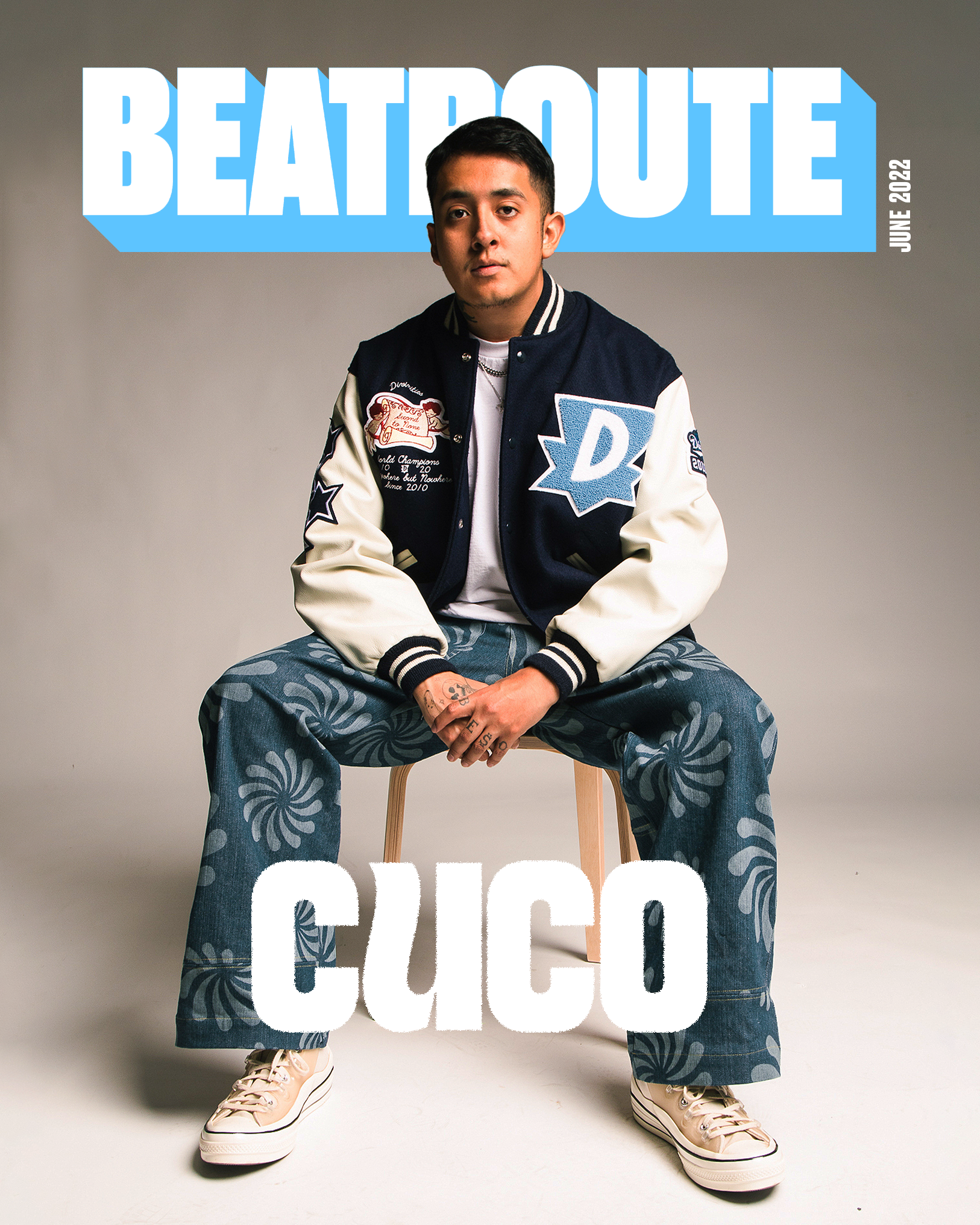COVER
Cuco
Invites You on a Psychedelic Trip
By Gabby Sgherri
Publishing date: Jun 06, 2022
A
An abstract art gallery curated by a Mexican,” Cuco tells me as the best way to describe his music. Born Omar Benos, the genre-defying artist’s 23rd year on earth is a good one as he wraps up performances at music festivals like Coachella and Primavera in Spain before releasing his sophomore studio album Fantasy Gateway on July 22nd and embarking on his own North American tour. He’s a first-generation Latin American, both of his parents are from Mexico, and while he proudly reps his heritage—often singing in Spanish and English—it doesn’t define his sound or identity. “I’m trying to show that there’s this freedom to still be able to represent who I am but without categorizing the music as Latin or Spanish more so just this Mexican kid doing a bunch of different music and it’s sick.” His music doesn’t fit in one singular genre, drawing inspiration from ‘80s synth-pop, trippy pop, cumbia, ‘60s bossa nova, and samba for his forthcoming album and crystallizing it into something that’s uniquely his own.
A highly anticipated track from Fantasy Gateway titled “Sitting In The Corner” features Mexican singer, Adriel Favela, and country-pop star Kacey Musgraves. Only Cuco, with his diverse palette of sounds and melodies, could bridge the gap between the genres of Favela and Musgraves. “I started off this song in Nashville with this producer Ian Fitchuk, we had the production started and I had [written] the hook. We took it to Mexico and my producer Manuel Lara was like yo what if we did something really crazy with this song and we got Adriel Favela on it.” For context, this is the first album Cuco hasn’t produced himself but even though he loosened the reins he was still heavily involved in the sonics of the album. Speaking about “Sitting In The Corner”, he continues to recount how he and Lara stripped back the bass guitar and incorporated Spanish guitar and a mariachi section to complete the production. “I sent it to Adriel and he responded back and was like this is sick I’ll get on this.”
An abstract art gallery curated by a Mexican,” Cuco tells me as the best way to describe his music. Born Omar Benos, the genre-defying artist’s 23rd year on earth is a good one as he wraps up performances at music festivals like Coachella and Primavera in Spain before releasing his sophomore studio album Fantasy Gateway on July 22nd and embarking on his own North American tour. He’s a first-generation Latin American, both of his parents are from Mexico, and while he proudly reps his heritage—often singing in Spanish and English—it doesn’t define his sound or identity. “I’m trying to show that there’s this freedom to still be able to represent who I am but without categorizing the music as Latin or Spanish more so just this Mexican kid doing a bunch of different music and it’s sick.” His music doesn’t fit in one singular genre, drawing inspiration from ‘80s synth-pop, trippy pop, cumbia, ‘60s bossa nova, and samba for his forthcoming album and crystallizing it into something that’s uniquely his own.
A highly anticipated track from Fantasy Gateway titled “Sitting In The Corner” features Mexican singer, Adriel Favela, and country-pop star Kacey Musgraves. Only Cuco, with his diverse palette of sounds and melodies, could bridge the gap between the genres of Favela and Musgraves. “I started off this song in Nashville with this producer Ian Fitchuk, we had the production started and I had [written] the hook. We took it to Mexico and my producer Manuel Lara was like yo what if we did something really crazy with this song and we got Adriel Favela on it.” For context, this is the first album Cuco hasn’t produced himself but even though he loosened the reins he was still heavily involved in the sonics of the album. Speaking about “Sitting In The Corner”, he continues to recount how he and Lara stripped back the bass guitar and incorporated Spanish guitar and a mariachi section to complete the production. “I sent it to Adriel and he responded back and was like this is sick I’ll get on this.”
I’m trying to show that there’s this freedom to still be able to represent who I am but without categorizing the music as Latin or Spanish
I’m trying to show that there’s this freedom to still be able to represent who I am but without categorizing the music as Latin or Spanish
Favela and Cuco decided it would be better to track their vocals in-studio together in Los Angeles. Fitchuk joined to check out the production and see the changes they’d made but had to dip to go see a show at Crypto Arena for none other than Kacey Musgraves. When Musgraves asked Fitchuk what he was working on in LA, he mentioned Cuco and eventually sent her the Favela assisted track. “[Kacey] was down to record and everything just pieced together, everybody was great from top to bottom and it’s a really sick genre-bending song. Nothing feels forced, it all flows really well,” Cuco says, wrapping up his story. It’s fitting for this psych-pop and Norteño fusion song to live on an album that is essentially a portal into Cuco’s mind creating an alternate universe for his fans to escape reality. “Fantasy Gateway is in a sense me creating my own world that is purgatory crossing with the dream world. I’ve always felt [that] the idea of purgatory is this melancholic eerie place where like in the dream world you have no control,” Cuco softly says explaining his vision. The heaven meets purgatory collision creates a dichotomy between the euphoria of being in a perfect place and the feeling of discomfort embedded in limbo. “It’s a weird feeling of it’s so wrong for something to be so perfect because you’re still escaping your reality but it’s a good weird feeling to be in this space.”
The union of concepts that intrinsically don’t go together is something Cuco’s gifted at and the visual representations of his music reflect the trippiness of his sound. Circling back to the idea of an art gallery curated by a Mexican, the gallery’s theme would be psychedelic art using vibrant colors and textures to capture the viewer’s eyes while Cuco’s eclectic music plays in the background and makes them forget there’s a whole other world outside. “I always look up psychedelic art, anything that has to do with psychedelia is what inspires me and motivates me,” he says before citing Fear and Loathing in Las Vegas and Easy Rider as the types of crazy psychedelic visuals he uses as a reference point. “I’m trying to go into the future with the visuals and some of those movies were trying to really be ahead of their own time, which I feel like they were, and I’m trying to replicate that. Make people be like yo this is so weird I don’t understand it but digestible at the same time.”
As Cuco goes into detail about his Fantasy Gateway visuals, it becomes clear he’s created his own world untethered to the constraints of time and space (as purgatory and dreams usually are) which draws a parallel to his music—unconfined by the restraints of genres. With every release, tour announcement, and merch drop he’s inviting fans into his waiting room while the countdown for the Fantasy Gateway portal to open begins. I can imagine his recent music videos, “Caution” and “Time Machine”, playing on loop on life-size screens and listeners slowly drifting into a state of lucid dreaming. “We started creating this world with the music video [for] “Caution” and using some AI-generated visuals. Not the minotaur, but all the other characters I drew, and the dudes over at Grin Machine were able to make 3D renders of [the] stuff I drew,” Cuco shares, emphasizing just how much of himself he pours into his art.

It’s a weird feeling of it’s so wrong for something to be so perfect because you’re still escaping your reality but it’s a good weird feeling to be in this space.
Beyond the sonics and visuals, Cuco’s lyrics carry as much importance for his fans. Stemming from introspective thoughts, he tackles relatable topics such as anxiety, mental health, longing, acceptance, and bad habits. The aforementioned single “Caution” explores the overwhelming feeling of grappling with mental health issues alone and not asking those around you for help out of fear that you’ll be bombarding them. “It’s super important if you have the resources and you can, [to] get therapy. Even if you’re okay it’s nice to have a therapist because it’s good to go in, talk and assess what you’re feeling,” Cuco earnestly says. As discussed in “Caution” carrying the weight of mental health on your back leads to feeling out of control when you inevitably can’t carry it anymore.
His openness to discussing therapy and mental health is another way he represents his heritage in a space that has historically been taboo for minorities due to a lack of resources. “I definitely think with minorities there’s a weird reaction towards the idea of therapy because it’s like well I didn’t have a therapist growing up, I just went through my own things,” he says summarizing the mentality of the older generations that parent Gen Zs and Millennials. “So when you think of therapy [the mentality is] oh you’re a crazy person but it’s really not that it helps you drain out those hidden feelings of the smallest fears in the back of your head because something [is] making you feel hyper anxious or depressed and getting to the root of it helps because then you learn how to deal with it the next time it comes around.” The self-awareness evoked by our conversation extends to his lyricism as the seed that bears fruit to other facets of his creativity and brings a dose of reality to the otherworldly psychedelic experience of Fantasy Gateway.

The musical expression of Cuco’s life experiences is a form of therapy for himself and his listeners, presenting topics that aren’t always happy, but a part of life, in a beautiful way that can encourage others to work through their own internal turmoil. “Seeking out help is not a bad thing, it’s not something that makes you weak [or] a crazy person. It’s really you looking out for yourself and makes you a better person for you and the people around you.” In a way, the creation of Fantasy Gateway was a form of purgatory for Cuco—cleansing his mind of thoughts and behaviors he wanted to part ways with. The creative process of examining his thoughts comes from self-awareness but to share those results with millions of others in the final form of an album stems from vulnerability. “It’s very heartfelt music, the vulnerability has a play because it’s relatable. People hear it and they’re like this is definitely how I feel—whatever the song expresses—this is what I’m feeling in the moment,” Cuco says, verbalizing the comfort others find in his music.
While everything from the lyrics and production to the visuals and concept starts with Cuco’s internal thoughts, he’s always thinking about the external results. “I think being able to impact people in a positive way is what I should be doing and that’s the job of every artist because I always feel like if I’m failing in that sense then I’m [not] doing what I’m supposed to be doing right.” At the end of the day, music is by nature a repetitive medium but the way in which Cuco does everything—explores genres, represents his culture, discusses introspective topics, and creates psychedelic experiences—is always unique because he knows who he is. As we wrap up our call, Cuco shares his excitement to be going on tour and bringing the trippy world he’s created to life (a show I’ll be attending on August 21st when he stops in Toronto) and whether you catch him live or experience it virtually—it’s Cuco’s psychedelic world, we’re all invited to go on a trip.
Photographer: Julian Burgueño and Giovanni Solis

